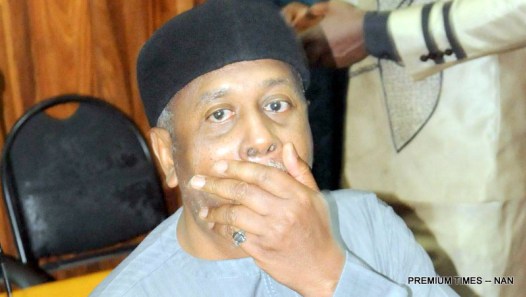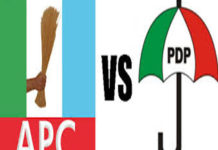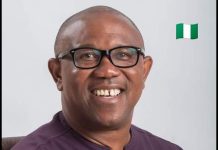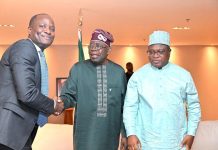An erudite law scholar, Mrs Nwagwu has 22 years postgraduate experience as an international criminal law attorney and development. Prior to her current position in the presidency, she has had a stint at the United States Agency for International Development (USAID); just as she was the National Project Coordinator for United Nations Office on Drugs and Crime (UNODC); the Legal Advisor for the Inter-Governmental Action Group Against Money Laundering and Financing of Terrorism in West Africa (GIABA), Senegal and the Commonwealth Secretariat – Governance and Institutional Development Division (GIDD}, London, UK; the British Department for International Development’s (DFID) and Acting Director of the Nigerian Financial Intelligence Unit, EFCC.

In this chat, she spoke on a wide range of issues, including Federal Government’s assets recovery, the continued detention of former National Security Adviser, the controversial Executive Order and war on corruption by President Muhammadu Buhari.
Would you thumb your chest to say that this government has made considerable strides in the assets recovery project, which your office has been handling?
We have made huge impact. If you look at what happened in the past, prior to 2015, there was no record of assets recovery. There was a time the House of Representatives conducted an investigation on recovered assets. But we could not come to a disclosure on what had been recovered – whether by EFCC, ICPC or NDLEA. And that led to the measures that this government put in place, one of which is establishing a central assets recovery account; setting up a presidential assets recovery committee; making sure that we set up an assets recovery unit within the Federal Ministry of Justice. We set up the whistleblower office within the Federal Ministry of Finance, as well as Assets Tracing Committee to determine what and what are being recovered, at least, at the national level. We also developed what we call an Audit Committee. The president approved it and the committee was inaugurated in December 2017. Their work is to go from one agency to the other to audit what they claim they have recovered. They are to determine whether there is money in the account, the nature of the assets- property, vehicles etc. They will now try to articulate their findings in a report. Within this period, we have also done or undertaken several international recoveries. We have been working closely with the US, UK, Island of Jazey and several other countries. We do that in order to determine where Nigeria’s stolen assets are located. Stolen assets are not just money, they could be property. For instance in Dubai, we discovered that many Nigerians have taken away money either by cash or otherwise and invested in businesses in the UAE. These are public officials who you could track that the monies that we are looking for are public funds. We are not looking for businessmen. We discovered that in UAE and Dubai, some former public servants have more that 10 property each that worth several millions of US dollars. So, one of the things we try to do is to track where they are. If you do not know whether the assets are, you cannot talk about recovery. We are lucky that the governments of some of these countries where the assets are located are interested in working with the Nigerian government. The president had signed bilateral agreements with some of these countries in order to exchange what we call mutual assistance in criminal matters. This works this way: in the process of exchanging this information Nigeria gets more information on where and where Nigerian assets are located. A lot of work is being done. The thing is that the aggregate of this work is what we did by drafting a law called the Proceeds of Crime Bill, which is currently before the National Assembly. The idea is that we want to aggregate all this work and have a sustainable approach to assets recovery in Nigeria. The process we have now is a bit not cohesive because they are in different laws. We are seeking to aggregate everything in a national law, in a National Asset Recovery Agency so that the challenges we had in the past would not continue to reoccur.
Government agencies and officials have had divergent claims on what the administration has recovered so far, why is it so?
As at today, we can talk about all the international recoveries, we can account for them. Once anything is recovered, once there is an agreement between Nigeria and any other country, there is a Central Bank account that has been established from 2016 and these monies go into the place directly. Anybody that goes to CBN will be told the figure that has been recovered so far.
Could you give an idea of the amount so far recovered?
I don’t have an idea. I can talk about the one I worked on directly, I can’t talk about others that occurred in the past few years. In the same vein, with regards to local recoveries, the president directed that all agencies must pay their money into the CBN regardless of whether it is an interim forfeiture. The challenge has been that in the past when there is a matter in the court and the court says you can hold this asset in the interim pending the determination of the suit, it means that 10 years after people are still talking about asset – either they are vehicles that will fade away and nobody will find the vehicles at the end of the case. So, what the policy today is saying is that even if it is interim forfeiture pay the money into an account so that if the court decides that person is not guilty, you go back to that CBN account and pay the person back the money. If the person is guilty, automatically the court will forfeit that money to the government. We have tried to close some gaps. The other way in which we have tried to close these gaps is through the Executive Order 6. When we are talking about the recovery of assets we mean well. For instance, if you take over a property as part of an interim forfeiture, whether in EFCC or ICPC Act, they have no provision on how you maintain this property, the facilities inside to avoid somebody stealing or pilfering it. So, what Executive Order has done is that between the interim and final forfeiture you must have a procedure of how to prevent people from going to take the property or sell them off and dissipate asset. So, the court will give an order and say, “this is how to maintain them. In terms of funds, the court can give an order for this money to be kept at the CBN account pending the determination of the suit. The individuals who are involved can also go to court and contest it. If you feel that this property is your own, the court is giving an interim order, we don’t want dissipation, you can sell it so that money can enter into an account pending the determination of the suit, if you go court and the court says “no don’t sell”, the Federal Government is obliged to respect that law. However, the provision also is that if you now decided that you don’t want it to be sold, you have to give a guaranty or a bond that if anything happens to those property, you would pay the government. If at the end of the case, you did not win the case and the property or the funds should go back to the government you must provide the amount of money the government should have got in the initial state. It is something that is happening globally. The United States government uses its revenue from recovered assets to run the Department of Justice. It is something that as a country, we must move away from the situation where we park vehicles for 10 years and at the end of the 10 years, we don’t find these vehicles.
The Executive Order has thrown up a lot of ripples and people feel that the Federal Government and the presidency want to sideline the courts and that everything is targeted at perceived political foes?
When you look at the Executive Order, it provides for procedures through which anybody that feels aggrieved can go back to court and request the court for review of any action taken by the government. That is what we call ‘judicial review’. And the essence of judicial review is to stop any action that infringes on the fundamental human rights. If you pick a copy of the Executive Order, it also speaks of respect of fundamental human rights, but also recognizing that the president under Section 5 and 15 is obliged (1) to issue orders in accordance with the constitution; in accordance with laws passed by the National Assembly and also in accordance with his obligations under Section 15 to ensure that he can do everything possible to stop or reduce corrupt practices within the country. It’s an obligation he has and in balancing it, Nigeria has passed laws. We are now saying, those laws can be made better to help in fighting corruption. That is why we put in the Proceeds of Crime Bill in the National Assembly. It has been there for a long time. The Seventh Assembly did not pass it. We are now asking this particular Assembly to pass it.
The argument is that the executive has contributed to the long stay of bills in the National Assembly by refusing to engage the lawmakers. Why has it been so?
I wouldn’t agree with you. The thing is that our jobs are separated. You have the role of the
National Assembly, which is to legislate; the role of the executive, which is to prepare the bills and to pass it to the National Assembly. You would expect that in the course of doing their work, if they really think that this is very critical, it is a bill that should come up on top of the list. Let me say “thank you” to the Senate. They have passed their own version. It is the House of Reps that we are waiting for. So, the Senate has done its work, we are now waiting for House of Reps to do theirs, unfortunately they have gone on recess. What that means is that we may not even pass it in this Eight Assembly.
Why did the executive sideline the National Assembly on the controversial Executive Bill?
No, no, no! It’s not possible. Once a bill leaves and the president transmits that bill, the procedure for passing it is completely within the ambit and business or rules of the National Assembly. It’s no longer within the presidency purview. By the time the bill comes out, what you see is sometimes not entirely the way you took it to the Assembly. It is based on public hearing, public consultation and contributions from both the members, as well as the Nigerian public. So, it is really not in order to say that bills do not have the inputs of the National Assembly. Nobody will say “take the bill, pass it out as it is”. It has never happened. Not to my knowledge; not in this country.
As adviser to the President on Judiciary Reforms, how do you feel when people accuse the government of not respecting court orders and judgments that are not favourable to it?
Name those judgments that this government has disobeyed.
Bails granted to Dasuki…
I wish you could tell me the couple of judgments that the government disobeyed apart from the Dansuki’s case, which is really based on national security interest. I want to know about other cases. If you have to balance national security, the interest of persons and individuals, there has never been any country where you allow an individual’s interest to override the national security. And until we can come to grasp with the facts that an individual sat back and allowed several human beings to be killed and slaughtered in the North-east without using the money meant for buying arms for the military. Until we come to grasp with the fact that the fundamental problems we have today, part of the security problems we have today, is traceable to the corruption that started way back before this government came into office. And if we are trying to balance that national security interest with that of individual interest, I am sure the courts will review their decision. The security problems we have today in Benue, Plateau, Taraba, Adamawa and other states are not something that are just happening, it goes beyond that. Somebody is funding it; somebody is equipping, somebody is making sure that those people can go out and create so much mayhem and kill several human beings. We need to come to terms that we have a national security problem in this country. And how we deal with it sometime is to allow a presidential directive to enable us to deal with these problems. What I am saying is that when we talk about the case as it is, we should always make sure that we do an analysis of the historical antecedents that led us to where we are today.
Are you saying that the courts that granted him bail did not take into consideration the national security implication?
The matter is still in court and the government of Nigeria reserves the right to go to appeal on that decision. So, the government of Nigeria is reviewing the judicial decision; the government of Nigeria will determine whether to go on appeal and request for ‘stay of execution’ on this matter. It is not a political matter. It is a security matter. I think between the judiciary and the executive, there is an on-going discussion as to whether this particular decision requires a further judicial review by way of an appeal. Let us allow the appeal process to be exhausted.
READ ALSO: How not to spend Abacha loot
Why did the government choose to share the money recovered from the late Sani Abacha loot on unknown poor Nigerians instead of using it to bridge the infrastructural deficits that will benefit all Nigerians?
We have explained these things in several fora and in several meetings. The National Social Investment Office has also explained it in details at a meeting we held at Rockview Hotels. Fundamentally, from 2015, when this government came into office, there has been an approval from the National Assembly for what we call the social investment programme. The social investment programme has different components. The School Feeding Programme; the N’Power Programme; the Cash Transfer Programme, as well as the Economic Empowerment Programme targeted at women. When the government of Nigeria started this process, every year, the National Assembly appropriated a certain amount of money for it. By 2017, when we realized that this recovery was going to be imminent, the judicial authorities in Switzerland based on what had happened in the past with recovered assets back to Nigeria, wanted a more strident procedure for transmission of this money back to Nigeria. And one of the procedure, which is under the United Nations Convention include social development goals (UNSDGs), the 2063 SDGs. All these social development goals recognize that you can use recovered moneys, which some of us never knew we could get back, when it went away; you can use it to affect the lives of ordinary people in the lowest level of communities. We entered into negotiation with the Swiss after the decision of the court. One of the decisions was that let it be used for a social investment programme. Two, Let it be used under the World Bank monitoring. We came back to Nigeria and we reported it; it went to the Federal Executive Council. It wasn’t just something that we sat back here and took that decision. When Nigeria looked at the budget, the only programme where this could fit in was the ongoing social investment programme. When Nigeria’s budget has already approved it on the Appropriation Act. In 2017 budget, one of the nine items for revenue was the recovery of the $322million and other assets to be recovered would be ploughed back as revenue into the budget. We said okay, instead of using other money from the treasure, why don’t we use this $322million and put it into the social investment budget. And if you did that, within the different programmes of the social investment programme, the cash transfer programme could reach everybody in the country. It could reach the people who do not have voice, who will not be on the table to negotiate where this money should go; people, who when they wake up everyday cannot find food to eat. People who cannot find transport money to go to the market or to go their farms. The idea was to lift people out of poverty. What we call excruciating poverty, which we know exist in this country today in several communities. If you take North-East IDPs, if you take what is happening in Benue today, there are IDPs; people who have been displaced from even their homes, no shelter.
SUN









